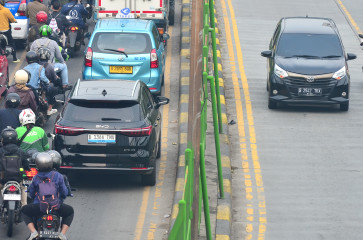Popular Reads
Top Results
Can't find what you're looking for?
View all search resultsPopular Reads
Top Results
Can't find what you're looking for?
View all search resultsDecriminalizing drug use
The spread of illegal drug use in Indonesia is at a worrying level
Change text size
Gift Premium Articles
to Anyone
T
he spread of illegal drug use in Indonesia is at a worrying level. And what is perhaps most concerning is that a large proportion of drug abusers are youths and young adults in potentially their most productive years.
Few will have been surprised by the arrest of Srimulat group comedian Kabul, alias Tessi, in Bekasi. Celebrities, TV stars and those working in the entertainment industry have long been a target for illegal drugs sales, the assumption being that people working in those industries have a high income and can therefore afford to buy drugs.
Law enforcement agencies have made efforts to curb illegal drug dealing and usage, but despite these efforts, crime statistics show no drop in the numbers of users and dealers.
Criminal sanctions apparently do not deter those who commit drug-related crimes.
The problems of handling illegal drug use through a criminal law-based approach reflect the difficulties of trying to win the war on illegal drugs.
In 2001, a former Australian health minister, Michael Wooldridge, stated that after 40 years of combating narcotics, there were still many obstacles to success which arise through the use of a criminal law approach to the problem.
Another opinion was offered by Justin B. Saphiro, who said that prosecuting drug users and addicts did little more than squander the limited resources of the judicial system, while encouraging corruption within law enforcement agencies.
2014 is officially the 'year for saving drug users'. The head of the National Narcotics Agency, Anang Iskandar, describing the magnitude of the problem in Indonesia, said there were four million drug users throughout the country. Of that total, only about 18,000 people, or 0.47 percent, receive the treatment and therapy needed to rehabilitate themselves.
The legal basis for the rehabilitation of drug users can be found in Article 54 of Law No. 35/2009 on Narcotics. It states that social and medical rehabilitation must be provided to drug addicts and victims of drug abuse.
The word 'must' indicates that this issue cannot simply be ignored, and it must be carried out in the enforcement of the law as it relates to narcotics.
However, it unfortunately appears that the provisions of the law are not fully understood or implemented. It seems that there is an extraordinary reluctance or hesitation on the part of law enforcement agencies to implement article 54.
It is not uncommon for prosecutors to bring charges under articles 111-114 instead of article 127 of
the narcotics law, as a charge under those articles disqualifies the defendant as a 'victim' of drug abuse.
Upon examination, it appears that the practice stems from a memorandum from the Supreme Court in 2010 about the minimum evidence required for bringing charges as a dealer of narcotics, such as five milligrams of marijuana or eight tablets of ecstasy.
The phrase 'any person who unlawfully or without due cause, owns, stores or possesses' narcotics above those amounts, may be charged as a dealer. The statement is regrettable as it has the potential to be very damaging to victims of drug crimes.
The concept of decriminalization is one where an act previously considered to be a crime is no longer considered a crime.
However, decriminalization should only be applied to users of narcotics. Decriminalization must not be confused with the legalization of drug use, but rather an approach where there is a choice of sanctions which may be applied, including the option of placing the offender in an institution for social or medical rehabilitation.
Former president Susilo Bambang Yudhoyono once stated that in drug enforcement, it is sometimes difficult to differentiate between victims and offenders.
The success of rehabilitation efforts should be judged not only on the physical rehabilitation of users, but on their ability to fully reintegrate into society and live a normal life ' without any negative stigma attached to their previous actions.
However, achieving that goal is not easy. It requires extensive education within the community to change the way most people think about drug users. According to the World Health Organization, only 1 in 20 drug users go on to live a normal life within the community.
It is our collective wish to create a society without drugs. Therefore, a health-based medical rehabilitation approach, as well as social rehabilitation, must be pursued in order to save drug abusers.
Courage is required from all elements of the criminal justice system (police, prosecutors and judges) as it will be impossible to implement the meaning and provisions of article 54 without significant political will from law enforcement agencies.
Around 18,000 of Indonesia's prison inmates are drug users. This gives rise to serious concerns about the rising numbers of those incarcerated for drug-related crimes and the ability of the stretched prison system to deal with them effectively and appropriately.
Hygiene conditions in prisons are also a cause for concern for the health of drug users, who, in many cases, require specialist medical treatment.
We must break the chain of drug abuse and save drug abusers from a terrible fate. Narkoba, or drugs, is also said to be short for neraka kok coba-coba ('why try hell?').
Never try something that could bring you to the edge of hell.
__________________
Hery Firmansyah lectures in criminal law at the Gadjah Mada University in Yogyakarta; Adam Fenton is researching for his PhD at Charles Darwin University.










